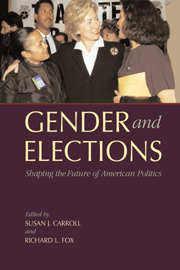Book contents
- Frontmatter
- Contents
- List of Figures, Text Boxes, and Photo
- List of Tables
- Acknowledgments
- List of Contributors
- Introduction: Gender and Electoral Politics into the Twenty-First Century
- 1 Presidential Elections
- 2 Voter Participation and Turnout
- 3 Voting Choices
- 4 Congressional Elections
- 5 African American Women and Electoral Politics
- 6 Political Parties and Women's Organizations
- 7 Advertising, Web Sites, and Media Coverage
- 8 State Elections
- Index
5 - African American Women and Electoral Politics
Journeying from the Shadows to the Spotlight
Published online by Cambridge University Press: 05 June 2012
- Frontmatter
- Contents
- List of Figures, Text Boxes, and Photo
- List of Tables
- Acknowledgments
- List of Contributors
- Introduction: Gender and Electoral Politics into the Twenty-First Century
- 1 Presidential Elections
- 2 Voter Participation and Turnout
- 3 Voting Choices
- 4 Congressional Elections
- 5 African American Women and Electoral Politics
- 6 Political Parties and Women's Organizations
- 7 Advertising, Web Sites, and Media Coverage
- 8 State Elections
- Index
Summary
Flashing her trademark warm, full, inviting smile and exuding her usual charisma, Carol Moseley Braun ended a campaign speech by making the signature statement of her campaign. Moseley Braun shared with the crowd the most important reason to choose her as the Democratic nominee for the 2004 elections, stating with a flourish, “I don't look like [George W. Bush]. I don't talk like him. I don't think like him. And I certainly don't act like him.” The crowd roared to their feet. After her speech, she dazzled the crowd, holding conversations with many between handshakes and hugs.
But for all the photo snapshots and autographs requested from those attending, the voters sensed the truth. Carol Moseley Braun was not a “real” presidential candidate. She had once again left voters with two distinct conclusions: first, that she is a dynamic candidate and should become the next president, and second, that unfortunately, she will never become president.
As the second African American woman to make a serious bid for the White House, Carol Moseley Braun ran as the “African American,” “the woman,” and perhaps most importantly, the “anti-Bush candidate.” At every campaign stop, she pointed to the ways in which she differed from not only President Bush, but also the entire field of Democratic contenders. Indeed, as Moseley Braun points out, she was unique among the nine candidates seeking the Democratic Party's nomination for the White House.
- Type
- Chapter
- Information
- Gender and ElectionsShaping the Future of American Politics, pp. 117 - 142Publisher: Cambridge University PressPrint publication year: 2005
- 6
- Cited by



